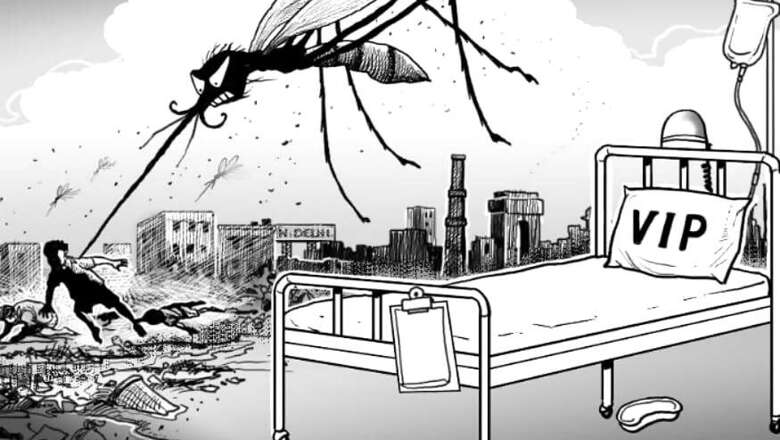
views
One of the most prevalent mosquito-borne diseases during the monsoon is dengue. A viral disease caused by the dengue virus, it is transmitted by the Aedes mosquito (Aedes aegypti) bite infected with any one of the four dengue viruses. The dengue mosquito bites in daylight which develops in the person after 3-14 days of the infective bite. Those already affected with the mosquito bite can infect others by transmitting the virus to other people through Aedes mosquitoes during 4-5 days of the onset of symptoms.
Mild dengue fever causes high fever, rash, and muscle as well as joint pain. Severe dengue fever, also called dengue hemorrhagic fever, can cause severe bleeding, a sudden drop in blood pressure and may even result in death.
It is always better to visit the nearest hospital or get oneself checked by a medical practitioner if they find the following symptoms, which may be a sign of dengue.
Here are the symptoms of dengue:
To start with, mild symptoms of dengue can be confused with other illnesses that cause rash, pains, aches and fever. The most common symptom of dengue fever are:
- Fever as high as 106 degree Fahrenheit
- Muscle pain
- Joint and bones pain
- Pain behind eyes
- Nausea
- Rash
In some cases, a person infected with dengue can witness minor bleeding from gums or nose.
Most people recover within a week or so but in some cases, symptoms worsen and can become life-threatening. Blood vessels often become damaged and leaky and the number of clot-forming cells or platelets in bloodstream drops which may result in bleeding from nose and mouth, severe abdominal pain, continuous vomiting, bleeding under the skin (might look like bruising), problems with lungs, liver and heart.
Treatment for dengue
There is no specific medicine till date to treat dengue infection but it is advised to see a doctor as and when a person develops any warning signs. A person can have pain relievers with acetaminophen and must avoid medicines with aspirin as it could worsen bleeding. However, it is always advisable to visit a doctor and follow the steps prescribed.
A person infected with dengue should also drink plenty of fluids and take adequate rest.
Prevention from dengue
Prevention is always better than cure. The only way to prevent this vector-borne disease is by avoiding mosquito bite because a vaccine can't protect against dengue. Dengue mosquitoes bite during the noontime. So avoid stepping out during noon and dusk.
According to WebMD, the FDA, in 2019 has approved a vaccine called Dengvaxia to help prevent the disease from occurring in adolescents aged nine to 16 who have already been infected by dengue.
But currently, there is no vaccine to prevent the general population from contracting it.
- Use a mosquito repellent with at least 10 per cent concentration of diethyltoluamide (DEET). Reduce exposed skin by wearing long-sleeved shirts, long pants, socks to prevent oneself from being bitten by the dengue mosquito.
- Use mosquito nets, screens to keep mosquitoes out.
- Avoid applying perfumes and soaps which may attract mosquitoes.
- Aedes mosquito breeds in clean or stagnant water. Remove any stagnant water in your vicinity, house.
- Clean water coolers, containers, buckets once a week as the mosquitoes that spread the dengue virus breed in such water.
- Must make it a point to keep wet garbage separate and covered. Segregate the waste in the house into wet and dry, especially during the season of transmission of dengue. This will restrict the growth and breeding of dengue mosquitoes.



















Comments
0 comment